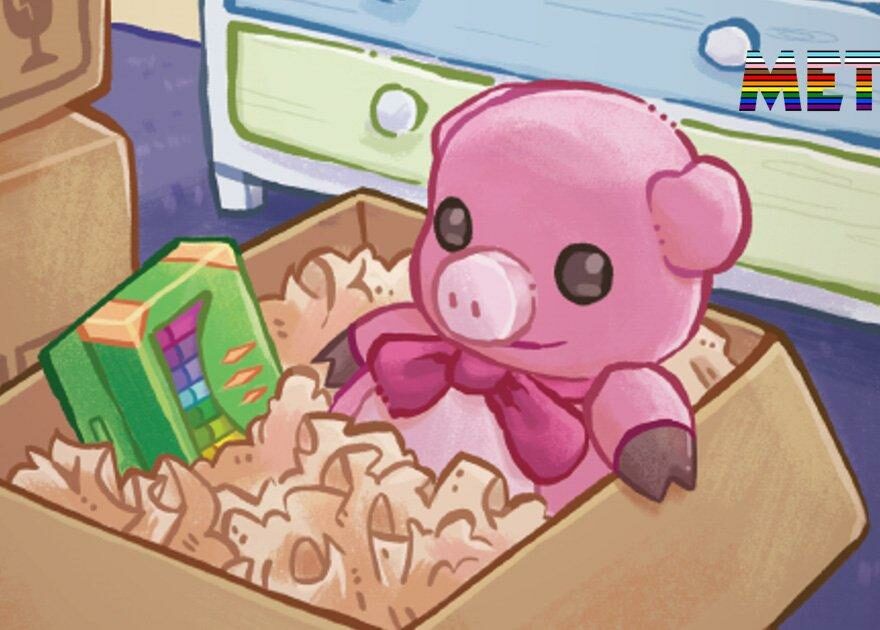Somehow there are two different video games about queer people moving house, but what do they really have to say about the queer experience?
What can we learn about queerness and representation of LGBTQIA+ communities in video games by analysing digital games focused on queer people moving from and into a house? This question may seem oddly specific, but queer theory scholar Sara Ahmed writes in her book Queer Phenomenology: Orientations, Objects, Others that ‘[i]n a way, we learn what home means, or how we occupy space at home and as home, when we leave home.’
If it’s true, video games about queer people moving house should be able to show us how we understand and depict queer and normative ways of inhabiting spaces. How queerness builds itself a home and whether it’s even able to do it.
In Witch Beam and Humble Bundle’s puzzle game Unpacking we follow the life of a female protagonist through her house moves, unpacking her boxes and placing all her items in the different dwellings. Her childhood bedroom in 1997. The college dorm. A shared house with two roommates. A boyfriend’s house where there’s not even room on the wall for her diploma and then back to her childhood’s room when she breaks up with him. Her first house and then the same house but this time we unpack the boxes of the protagonist’s girlfriend. And, finally, a new massive house into which they move with their child.
Unpacking’s protagonist may be queer, but her life follows a somehow traditional trajectory: at the end of the story she has a diploma, a monogamous relationship, a baby, a big house, and a successful job (she is an illustrator). Unpacking’s protagonist closely follows what Elizabeth Freeman calls chrononormativity in Time Binds. Queer Temporalities, Queer Histories. It follows the deeply internalised milestones and daily rhythms of a (re)productive Western life devoted to the accumulation of capital.
Let’s compare Unpacking with Humble Grove (Cel Davison and Hana Lee) and Fellow Traveller’s No Longer Home, a game that explicitly references Ahmed’s book in its credits and that was released in the same year as Unpacking (2021). In this semi-autobiographical point ‘n’ click narrative experience, two non-binary protagonists, Ao and Bo, are leaving the London house where they have been living together for a year.
They have just graduated from an art college, but they are unemployed, and Bo is going back to their parents and Ao (who is Japanese, and half Korean) must go back to Japan because of immigration laws. There’s no room for them in gentrified London or in the art world. There’s no progression, no agency, and no puzzle we can solve to make the protagonists inhabit the space (to make themselves at home) and reach a happy ending.
In Fullbright’s seminal walking simulator Gone Home, released in 2013, a girl named Katie goes back home after a long trip through Europe. It’s 1995 and, during her absence, the family moved into a new house (formerly owned by a relative), but when Katie arrives she can’t find either her parents or her younger sister Sam.
By exploring the unknown house, finding clues and unlocking new areas and journal pages left by Sam, Katie reconstructs what happened. After moving to a new high school, Sam felt lonely and isolated, until she met another girl, Lonnie, with whom she fell in love and decided to run away, since her parents didn’t accept her homosexuality.
In Gone Home both Katie and Sam have gone home: by following a fairly linear (we could even say straight) path through the game, we see Katie master the structure of the house while Sam finds her place with Lonnie. In No Longer Home, home is no more (no longer). It’s as precarious as everything else in the life of these marginalised working class characters.
If being queer also means being queerly situated in space, it also means being unable to fit into both social and architectural structures designed for the chrononormativity of the heterosexual and cisgender (and white and with no disabilities) body.
We often talk about the amazing progress of LGBTQIA+ representation in video games but the comparison between Unpacking and No Longer Home shows the contradictions within this growing depiction of queerness in the media. It’s not a quality issue, I don’t think the problems with queer representation in games like Unpacking come from superficiality and an unintentional lack of nuances. Quite the opposite: I think Unpacking consciously and methodically undermines the queerness of the protagonist, and queerness in general, in order to promote her assimilation into traditional capitalist work ethics and family values.
It’s like the third episode of the HBO adaptation of Sony’s video game The Last Of Us, where we follow the life of a gay couple building their own fortified love nest during the zombie apocalypse. That’s the kind of queerness that the entertainment industry can accept, a neutralised queerness embracing the American dream of defending private property with an automatic rifle.
Email [email protected], leave a comment below, follow us on Twitter, and sign-up to our newsletter.
Follow Metro Gaming on Twitter and email us at [email protected]
To submit Inbox letters and Reader’s Features more easily, without the need to send an email, just use our Submit Stuff page here.
For more stories like this, check our Gaming page.
Sign up to all the exclusive gaming content, latest releases before they’re seen on the site.
Source: Read Full Article


